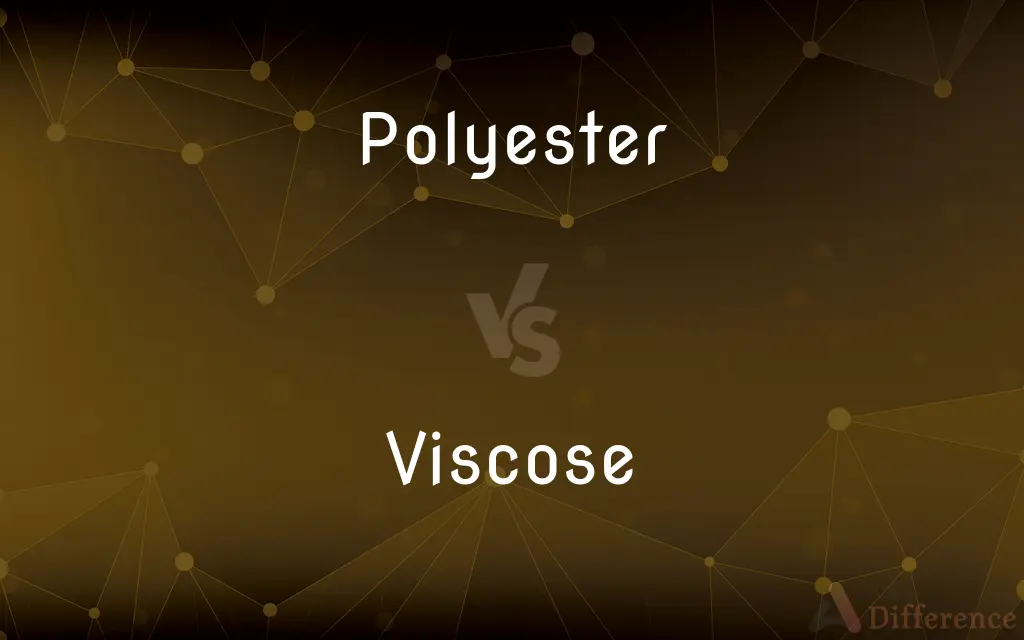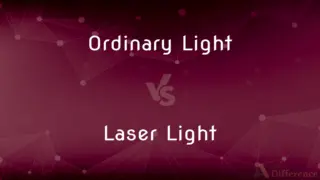Polyester vs. Viscose — What's the Difference?
By Tayyaba Rehman — Published on January 1, 2024
Polyester is a synthetic, durable, and wrinkle-resistant fabric; viscose, also known as rayon, is semi-synthetic, soft, and mimics silk or cotton in feel.

Difference Between Polyester and Viscose
Table of Contents
ADVERTISEMENT
Key Differences
Polyester, a fully synthetic fabric, is known for its durability and resistance to wrinkles and shrinking. Made from petroleum-based fibers, it is often used in a wide range of apparel and home furnishings. Viscose, also known as rayon, is a semi-synthetic fabric made from regenerated cellulose, typically derived from wood pulp. It is valued for its silk-like feel and its ability to mimic the properties of natural fibers like cotton or silk.
The production process of polyester involves the polymerization of ethylene glycol with terephthalic acid, resulting in a strong and stable fiber. This process makes polyester less breathable but highly resistant to environmental conditions. Viscose production, on the other hand, involves dissolving wood pulp and regenerating it into fibers. This process gives viscose its unique drape and softness, but the fibers are weaker, especially when wet.
Polyester is known for its low moisture absorbency, which contributes to its quick-drying properties. It is often used in outdoor and performance wear due to its ability to wick moisture away from the body. Viscose, in contrast, is highly absorbent and offers more breathability, making it comfortable for wear in warm climates, but it can lose strength when wet and is less durable over time.
In terms of care, polyester is low-maintenance, often requiring just basic washing and drying. It is less prone to wrinkles and maintains its shape well over time. Viscose requires more careful handling, often needing gentle washing and air drying to maintain its texture and prevent shrinking or warping.
Environmentally, polyester is less sustainable due to its petroleum-based origin and longer degradation time. Recycling initiatives are improving its eco-footprint. Viscose, while made from renewable resources, has environmental concerns due to the chemicals used in its production process, though eco-friendly variants are being developed.
ADVERTISEMENT
Comparison Chart
Material Origin
Synthetic (petroleum-based)
Semi-synthetic (cellulose-based)
Durability
High
Lower than polyester
Moisture Absorbency
Low
High
Breathability
Less breathable
More breathable
Care Instructions
Easy care, machine washable
Requires gentle care
Environmental Impact
Less sustainable, slowly degrades
Concerns due to production chemicals
Compare with Definitions
Polyester
Synthetic Fabric: Made from artificial fibers.
The polyester jacket is perfect for rainy weather.
Viscose
Semi-Synthetic Fiber: Made from regenerated cellulose.
The viscose dress drapes beautifully due to its soft fabric.
Polyester
Low Moisture Absorbency: Does not absorb much moisture.
Polyester activewear is great for workouts as it stays dry.
Viscose
Breathable Fabric: Allows air to pass through easily.
Viscose clothing is comfortable in hot weather.
Polyester
Widely Used: Common in various types of clothing.
Polyester fibers are used in everything from t-shirts to curtains.
Viscose
Sensitive to Water: Loses strength when wet.
Care must be taken when washing viscose garments.
Polyester
Durable Material: Known for its durability and strength.
This polyester blend fabric resists wear and tear.
Viscose
Silk-Like Feel: Mimics the feel of silk.
This viscose scarf feels as luxurious as silk.
Polyester
Wrinkle-Resistant: Less prone to wrinkling.
My polyester shirt remains smooth after washing.
Viscose
A thick, golden-brown viscous solution of cellulose xanthate, used in the manufacture of rayon and cellophane.
Polyester
Any of numerous synthetic polymers produced chiefly by reaction of dicarboxylic acids with dihydric alcohols and used primarily as light, strong, weather-resistant resins in boat hulls, textile fibers, adhesives, and molded parts.
Viscose
Viscose rayon.
Polyester
A wrinkle-resistant fabric of fibers made from any of these resins.
Viscose
Viscous.
Polyester
Any polymer whose monomers are linked together by ester bonds
Viscose
Of, relating to, or made from viscose.
Polyester
A material or fabric made from polyester polymer
Viscose
A viscous orange-brown liquid obtained by chemical treatment of cellulose and used as the basis of manufacturing rayon and cellulose film.
Polyester
Of, or consisting of polyesters
Viscose
A fabric made from this material.
Polyester
Any of numerous synthetic resins; they are light and strong and weather resistant
Viscose
A cellulose ester obtained by treating cellulose with caustic soda
Polyester
A complex ester used for making fibers or resins or plastics or as a plasticizer
Viscose
A rayon fabric made from viscose (cellulose xanthate) fibers
Polyester
Any of a large class of synthetic fabrics
Viscose
High Absorbency: Absorbs moisture well.
Viscose towels are excellent for quick drying.
Common Curiosities
Is polyester environmentally friendly?
Not particularly, but recycling efforts are improving its sustainability.
Does viscose shrink in the wash?
Yes, it can shrink, so gentle washing is recommended.
Can polyester be recycled?
Yes, polyester can be recycled, enhancing its eco-friendliness.
Is polyester better for outdoor clothing?
Yes, due to its durability and moisture-wicking properties.
Can viscose be ironed?
Yes, but on a low heat setting and preferably with a cloth barrier.
Is viscose a good choice for summer clothing?
Yes, its breathability makes it suitable for warm weather.
Can polyester cause skin irritation?
Some people may find it less comfortable or irritating compared to natural fibers.
Does polyester retain odors?
It can, especially in comparison to natural fibers.
Can polyester blends improve fabric properties?
Yes, blending with natural fibers can enhance comfort and breathability.
Is viscose biodegradable?
Yes, it is more biodegradable than synthetic fibers like polyester.
How is viscose typically used?
It's often used in dresses, blouses, and linings for its drape and softness.
How does viscose impact the environment?
Its production involves chemicals, raising environmental concerns.
Is viscose suitable for athletic wear?
Not ideally, as it loses strength when wet and doesn't wick moisture.
Are polyester fabrics breathable?
Generally, they are less breathable than natural fibers.
Is polyester a good choice for formal wear?
It can be, especially in blends that mimic the feel of natural fabrics.
Share Your Discovery

Previous Comparison
Ordinary Light vs. Laser Light
Next Comparison
EFT vs. NEFTAuthor Spotlight
Written by
Tayyaba RehmanTayyaba Rehman is a distinguished writer, currently serving as a primary contributor to askdifference.com. As a researcher in semantics and etymology, Tayyaba's passion for the complexity of languages and their distinctions has found a perfect home on the platform. Tayyaba delves into the intricacies of language, distinguishing between commonly confused words and phrases, thereby providing clarity for readers worldwide.















































